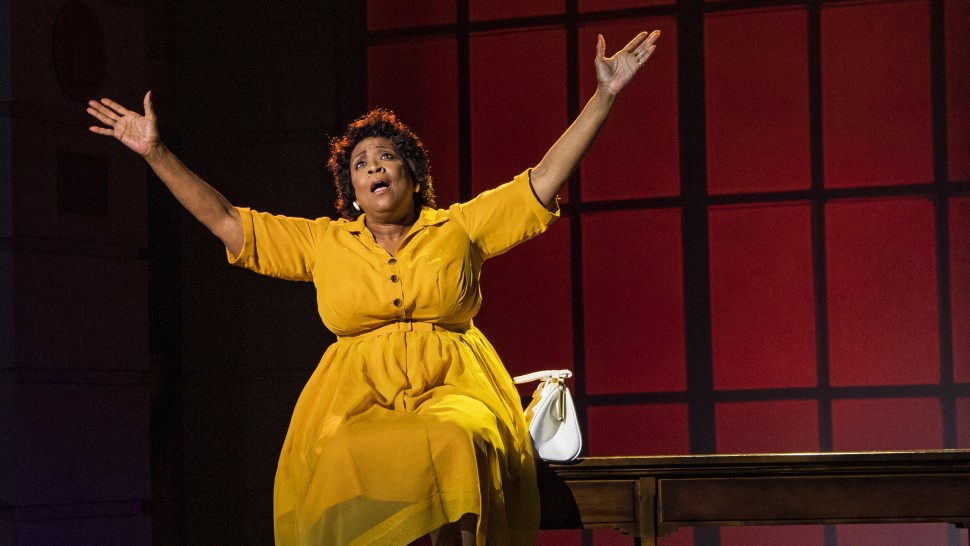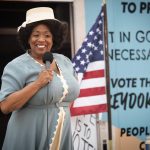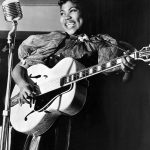On March 3, when E. Faye Butler took her final bow on the set of Fannie: The Music and Life of Fannie Lou Hamer, Asolo Repertory Theatre successfully accomplished what theatres across the world have been struggling to do for a year: to create. Each night, a maximum audience of 200 patrons sat under the Florida sky to see the production, chairs organized in pods of two and distanced but united in the time-honored tradition of experiencing live performance.
Since March 2020, COVID precautions have caused theatre to largely shift to a digital format, re-defining what the art form could be but leaving the arts community craving more substantive experiences. Zoom readings, virtual musical concerts, and more have replaced traditional theatre. But this temporary solution is largely unsustainable for the many people that theatre employs. At present, Be An #ArtsHero estimates approximately 2.7 million artists including theatre workers are out of work. Many artist are struggling to simply stay afloat during this time of crisis.
With Fannie, Asolo Rep has taken a large step forward in re-imagining what theatrical production can look like as the arts community seeks to rebuild. The show marked the Sarasota theatre company’s first full production since the COVID-19 pandemic forced stages across the United States to go dark.
Written by Cheryl L. West, Fannie follows the events that led Fannie Lou Harmer from her life as the daughter of a share cropper in Mississippi to co-founding the Mississippi Freedom Democratic Party. Directed by Henry Godinez on an outdoor stage in front of the theatre’s entrance, the production played Asolo Rep February 20 – March 3, the first stop in the show’s rolling world premiere in association with the Goodman Theatre and Seattle Rep.
There is an odd juxtaposition between this one-woman show and the schedule to which Asolo Rep was accustomed. As a repertory company, the theatre was used to a packed season. In fact, in March 2020, the theatre had three acting companies in residence: one finishing a production of Into the Breeches in its 535-seat main auditorium, another company in tech for The Great Leap in its 165-seat venue, and the third preparing to debut Frank Galati, Stephen Flaherty, and Lynn Ahrens‘ new musical Knoxville.
The pandemic would alter those plans and the theatre’s trajectory. But where Broadway had clear guidelines, many regional theatres were left to figure out how to navigate on their own. And without guidance, the future of the company was left to Producing Artistic Director Michael Donald Edwards. “Everyone was asking, ‘What are you doing?’ like I had some kind of insight,” he explains. “And I would say, ‘I know what you do. I’m getting the same information. I’m reading the same stuff.’ [The government] kept giving more and more responsibility to local people. We were getting so little direction from the local, state, and federal level, and basically the decision was being left to us. I said let’s follow the CDC. As the numbers started to skyrocket, I got together with my director, assembled everyone in the theatre and said, ‘We’re sending you all home. We’re closing down.’”
The announcement would be made to the public shortly thereafter. In a press release on March 19, 2020, Edward wrote, “It is absolutely heartbreaking that the companies of these shows, which have done some of the most remarkable work I have seen in my 14 years in this position, will not have the opportunity to perform this season on our stage. These decisions were not made lightly, but we deem them necessary to support our community’s and the world’s efforts to respond to the spread of the virus.”
The effects of canceling the season were immediate and far reaching. Not only would canceling mean ceasing production and ending work for many of the company’s employed artists and staff, several artists needed to be housed, stranded after having subletted their apartments to go to Florida for their contract. And as a subscription-based theatre company, canceling required calling each of Asolo’s subscribers to give the options to either receive a refund, offer their subscription as a donation, or put it into an account for the next year. “It was a logistical nightmare. But you know what? Everyone in the organization rose to the occasion and knew that it was the right thing to do.”
With an empty theatre and a community looking for engagement, Asolo Rep trekked forward with virtual programming, creating recurring events like Monday Musical Moments and From the Archives—series that looked back into company’s production history—as well as online readings, interviews, master classes, and more. But Edwards says the theatre’s usual audience, many of whom were uninterested in on-screen events, were craving more.
“Our subscribers are older. They don’t love digital media. [They were saying] we want theater. And I said we’ve got to find a way to produce. So we know we can’t go inside, which is where we do everything for the time being. We have to find a way to perform outside.”
Read More: Playbill




